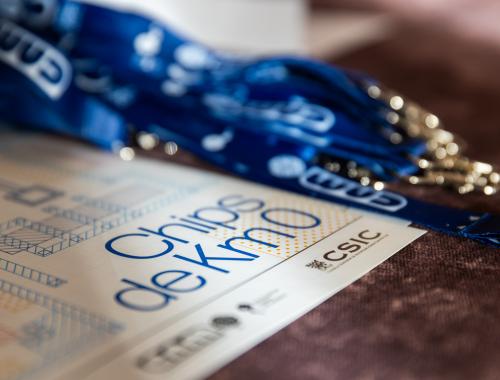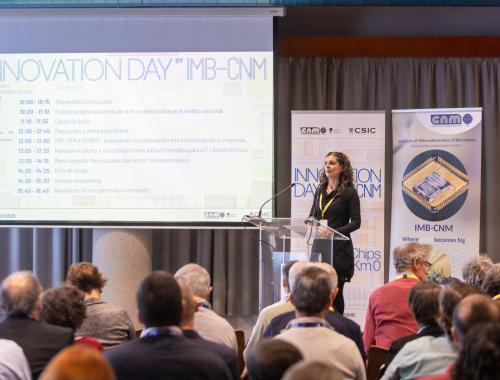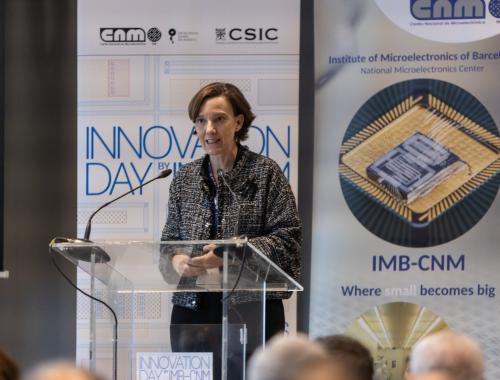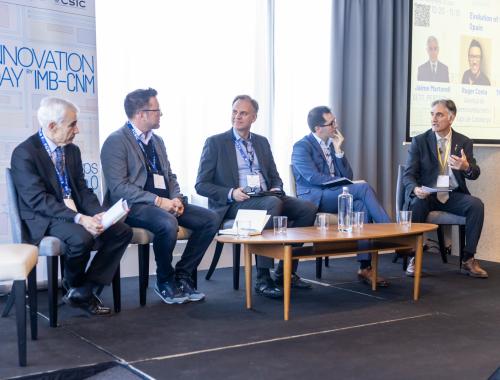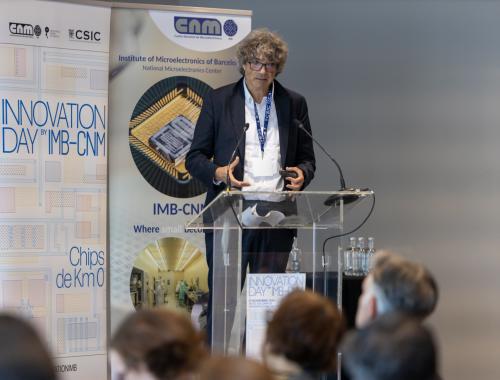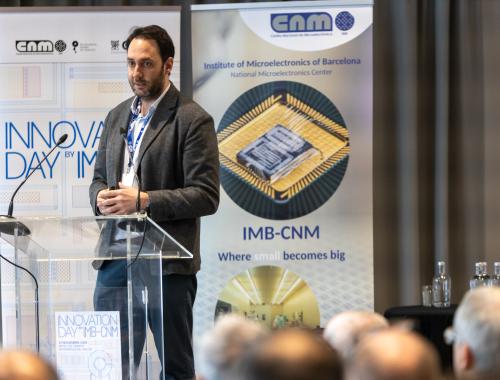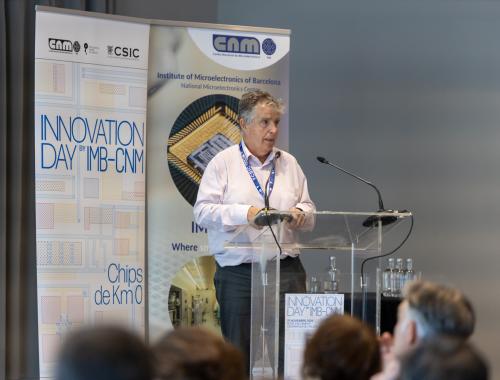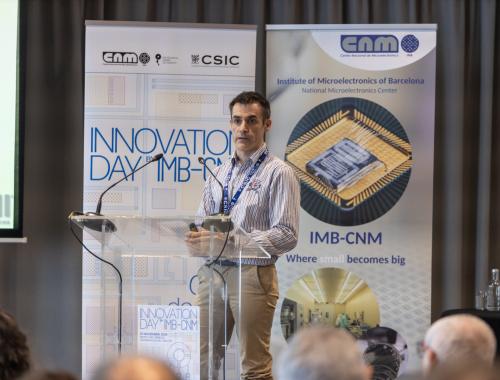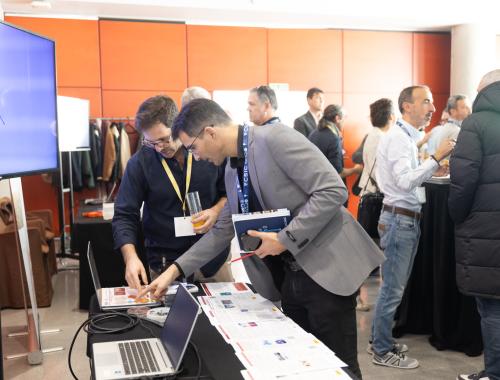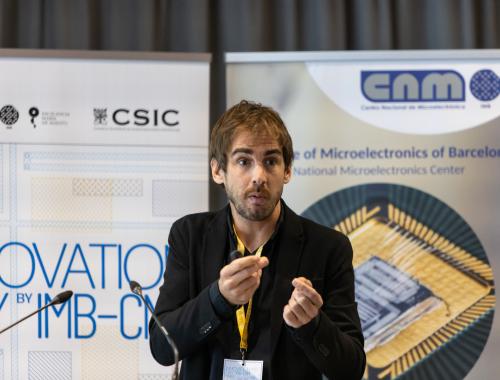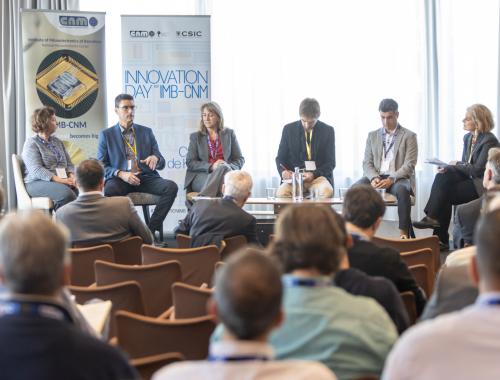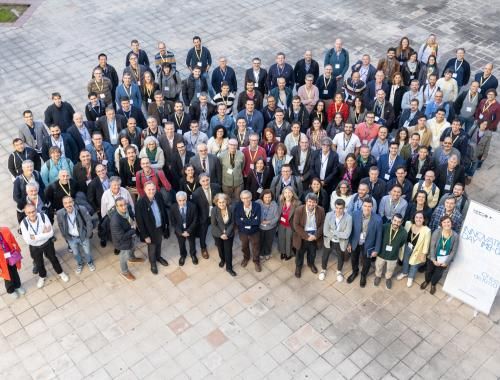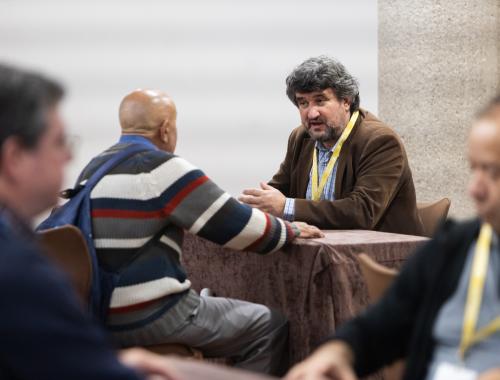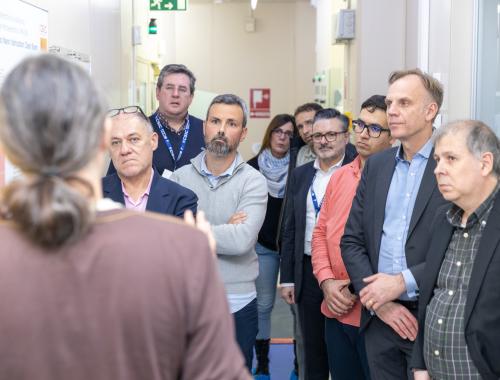Driving Microelectronics: success stories and perspectives from IMB-CNM
The 2nd Innovation Day: 0 Km Chips by IMB-CNM-CSIC brought together nearly 170 attendees who participated in discussions on the rapid evolution of the microelectronics sector, its current needs, and the received funding
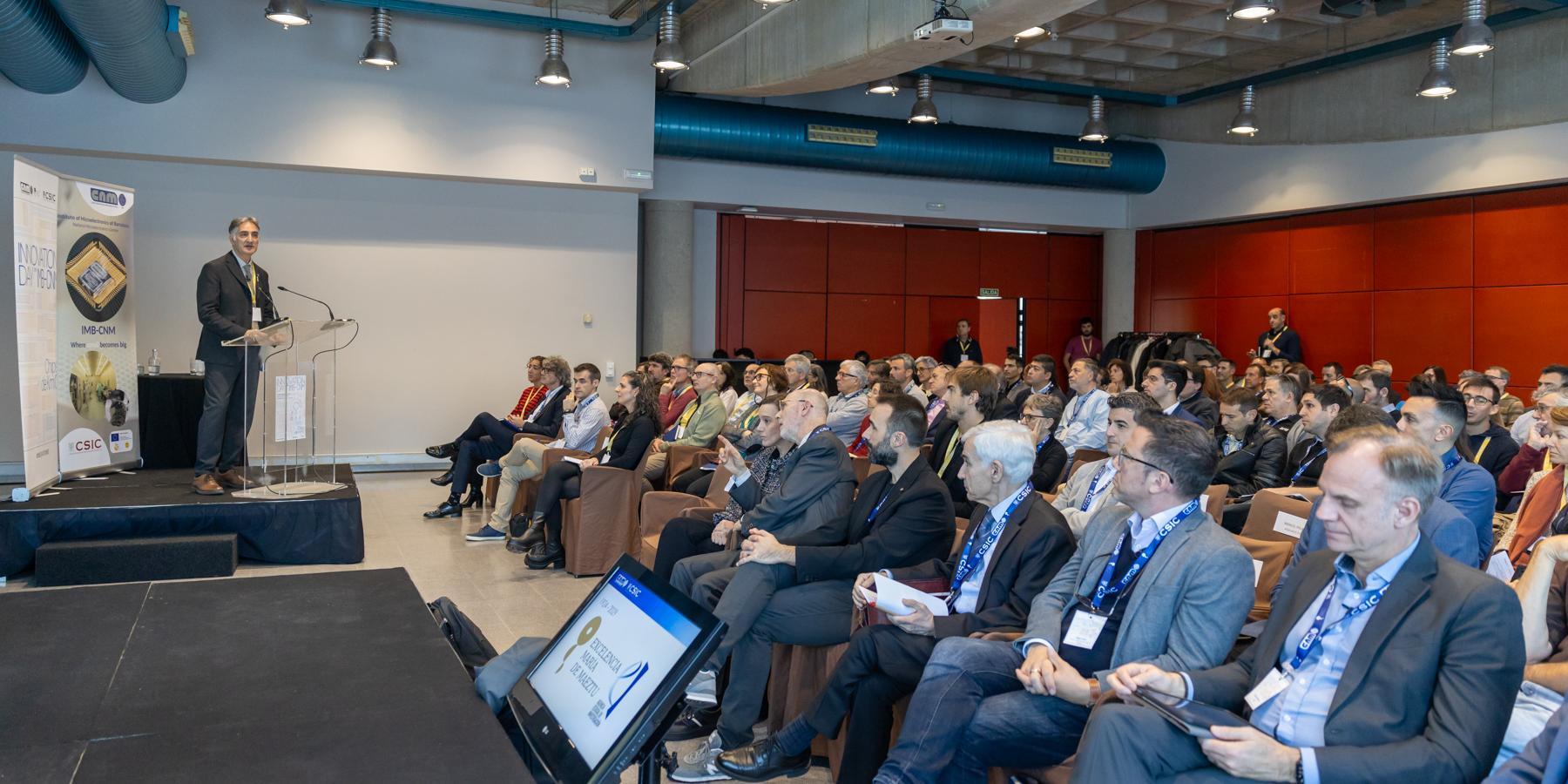
The event gathered over 170 participants, including representatives from companies, business associations, freelancers, and research staff. Attendees had the opportunity to witness two panel discussions and six presentations, addressing topics such as the evolution of the microelectronics sector in recent years, the training needs, the allocation of received funding, and the importance of knowledge transfer to enhance collaborations between industry and research.
The second edition of the Innovation Day: km 0 Chips organized by the Institute of Microelectronics of Barcelona (IMB-CNM, CSIC) took place on November 27 at the Exe Campus Hotel in Cerdanyola del Vallès, from 9:00 AM to 5:00 PM.
The first panel featured Luis Fonseca, Director of IMB-CNM and CSIC Research Professor; Jaime Martorell, Vice President of the Spanish Society for Technological Transformation, under the Ministry for Digital Transformation and Public Administration; Thomas Kallstenius, Coordinator of Activities at IMEC Spain; Roger Costa, Strategic Project Manager at the Directorate General for Industry of the Government of Catalonia; and José Antonio Garrido, ICREA Research Professor at the Catalan Institute of Nanoscience and Nanotechnology (ICN2) and representative of the Lab-to-Fab Innofab proposal.
They all highlighted the significant momentum microelectronics is experiencing, driven by the expertise of its professionals and the availability of various funding opportunities through strategic initiatives such as the Recovery, Transformation, and Resilience Plan PERTE Chip or the European Chips Act. They also emphasized the need for continued growth through the arrival of new companies and the creation of new semiconductor manufacturing facilities, such as the Innofab pre-production technology center for advanced material chips. This initiative is supported by entities like IMB-CNM-CSIC, ICN2, the Institute of Photonic Sciences (ICFO), the Autonomous University of Barcelona (UAB), and the Alba Synchrotron, with backing from the Government of Catalonia.
In this regard, Martorell emphasized that "it is essential to focus on identifying key projects like IMEC, which are crucial for developing and consolidating the microelectronics ecosystem in Spain and integrating it into the European framework." Another key factor in this development and consolidation is the significant investment in microelectronics, which has outpaced that of any other sector in recent years. A public investment of €12.25 billion is planned in Spain between 2022 and 2027 through the PERTE Chip initiative, alongside €43 billion in public and private investment across Europe under the European Chips Act.
Costa, as a representative of the Aliança de Semiconductors i Xips de Catalunya, highlighted the importance of collaborating through the European Semiconductor Alliance. Its objective is to "combine efforts to strengthen connections with our government [referring to the Catalan government] and European bodies, helping them understand our ecosystem and its capabilities while aligning actions with other regions that share similar interests."
Kallstenius highlighted the ambitious commitment of IMEC to Málaga, as it will be the first time they establish a production facility outside of Belgium, and expressed gratitude for the support from Spanish authorities at various levels. He also emphasized the commitment to laying solid foundations for collaboration with the Spanish ecosystem, as a facility of the planned scale will take several years to develop.
Fonseca urged the various stakeholders at the table to work together to define a value chain among current and future actors in the manufacturing ecosystem, ensuring that each party’s contributions complement each other effectively.
Collaboration and Training: Key Components for the Development of the Microelectronics Sector
The event featured Ana Castro, Vice President of Innovation and Transfer at CSIC, who presented the CSIC Converge hub, which connects researchers with companies and promotes open innovation.
The strong relationship and mutual respect between academia and industry are two key factors for improving collaboration. As part of this, four success stories were presented, featuring Germán Vergara, Technical Director of New Infrared Technologies (NIT); Rosendo Garganta, Founder and CEO of Devicare; Miguel Ángel Pérez, Director of Innovation and Digital Transformation at Fagor Electronics; and Alberto Hernández, Scientific Director of Arrays for Cell Nanodevices (A4cell). In their presentations, they showcased their new devices, many of which were developed from ideas supported by research from IMB-CNM, whether in microelectronic design or through manufacturing in the Micro and Nanofabrication Clean Room. These examples spanned a wide range of companies, from large to small, highlighting the long-lasting nature of several of these collaborations.
Vergara highlighted that the relationship between the company and the institute has always been excellent over the more than twenty years of collaboration and added, with a humorous tone, "the only difference is that you support Barça and we are Real Madrid fans."
Daniela Bassignana, project manager at D+T Microelectrónica A.I.E. and quality management officer for the IMB-CNM Clean Room, emphasized what is essential to drive professional collaboration between research and businesses. "Good management equals quality management," she stated regarding the ISO 9001 certification, which represents a success in these collaborations and certifies IMB-CNM as a committed center that offers continuous support and improvements to businesses.
Gonzalo Murillo, 2023 National Research Award for Young Researchers 'Ángela Ruiz Robles' in Technology Transfer, IMB-CNM researcher and co-founder of the spin-off Energiot, shared what he considers the keys to success in entrepreneurship: "Surround yourself with good teammates, stop trying to sell the product to the customer and focus on understanding their needs in order to propose solutions based on that, take the product out of the lab and test it in real-world conditions."
Cecilia Jiménez, scientific researcher at IMB-CNM and co-founder of AIQUOS, moderated a roundtable discussion on the sector's needs. The panel included Núria Barniol, UAB Coordinator of the Master's in Semiconductor Engineering and Microelectronic Design; Albert Casas, Commercial Manager and Director of the Microelectronics Division at INCORPORATECHNO Group; Montserrat Guàrdia, Chief People & Culture Officer at IDEADED and President of the Social Council of the Universitat Politècnica de Catalunya; Gonzalo Murillo; and Carles Oriach, Strategy and Development Directors at Monocrom.
The debate focused on the question, "Is there sufficient academic training available to create professionals?". To address this, the discussion included the creation of the Master's in Semiconductor Engineering and Microelectronic Design, as well as the professional training programs offered through the INCORPORATECHNO group. Barniol highlighted the innovation success of "creating a professional microelectronics master's program with professionals from four public Catalan universities and IMB-CNM-CSIC" and emphasized that "companies have a strong connection, as they participate in the advisory committee, guide students, and make their needs known." For his part, Casas stressed the importance of "continuing to train active professionals to enable them to pivot within the sector through technical training courses." "A great opportunity for this is to offer micro-credentials to workers," added Guàrdia.
They agreed that attracting new workers and retaining those already in place are equally important. To achieve this, the discussion emphasized the importance of offering good job opportunities and balancing salary with favorable working conditions. Oriach stressed that "there must be clear career plans so that individuals know how they can progress within the company and all the opportunities available to them."
Kilometer 0 chips: positive impact and diversity of applications
"We are very pleased with the outcome of the Innovation Day: 0 km Chips. The goal of the event is to highlight the positive impact of our collaboration results with industry in such diverse applications as medicine, life sciences, and energy," stated the director of IMB-CNM at the end of the event. "Without a doubt, these testimonials from 'satisfied clients' are the best ambassadors of the diverse reach of semiconductor technology in general, and of local chips in particular," he concluded.





